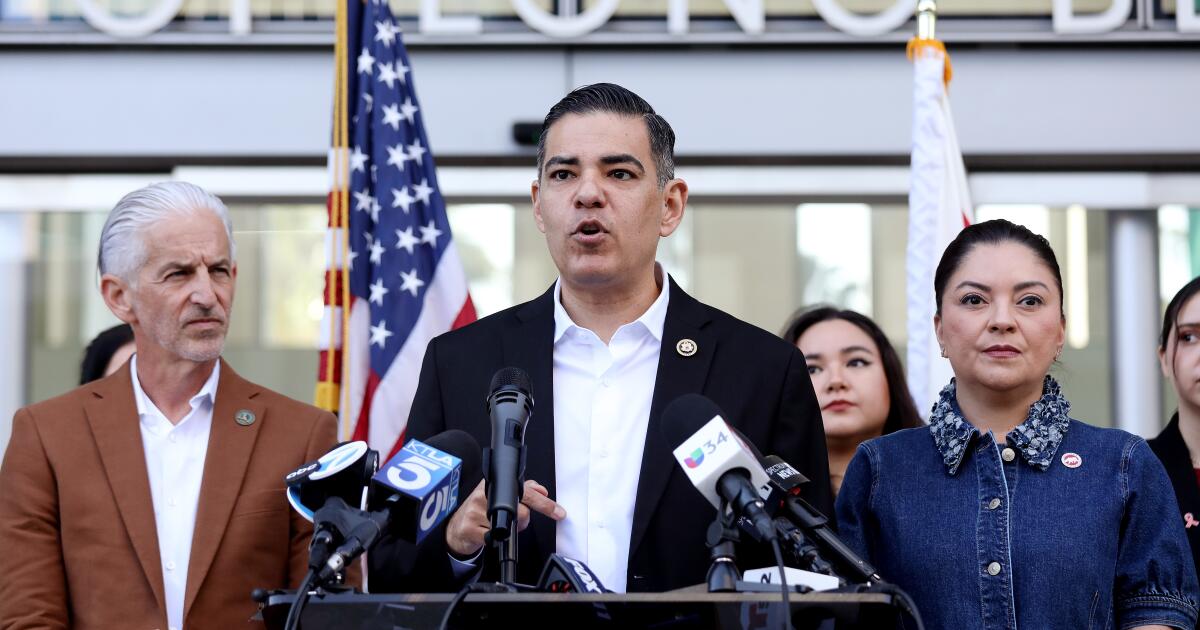Leading Democrats have rolled out a new and unvarnished message — that the U.S. Department of Justice cannot be trusted.
“Let’s be really clear: We can’t trust anything the DOJ does. The DOJ is corrupt. They’re corrupt on every major issue in front of this country,” Rep. Robert Garcia (D-Long Beach), ranking member on the House Oversight Committee, said Friday at a news conference in his district.
“We cannot trust the Department of Justice. They are an illegitimate organization right now under the leadership of [Atty. Gen.] Pam Bondi and the direction of Donald Trump,” House Minority Leader Hakeem Jeffries (D-N.Y.) said during his own news conference in Washington, D.C.
The remarks — which hold profound implications in a two-party democracy meant to be protected and served by a nonpartisan justice system, and which a White House spokesperson called “shameful” — followed a week of equally stunning actions by the Justice Department, where President Trump has installed staunch loyalists, including Bondi, to high-ranking positions.
In recent days, the Justice Department has resisted launching civil rights investigations into two fatal shootings of U.S. citizens in Minneapolis by federal immigration agents. It has since reversed course and launched such an investigation into the second of those incidents, in which 37-year-old Alex Pretti was shot while surrounded by agents, on the ground and disarmed, but has held firm in its decision not to investigate the earlier shooting of 37-year-old Renee Good, who was shot while trying to drive away from a tense exchange with agents.
On Wednesday, the FBI raided and seized voter ballots and other information from the election headquarters of Fulton County, Ga., long a target of Trump’s baseless and disproven claims that widespread voter fraud helped Democrats steal the 2020 election. Bondi was an early backer of those baseless claims, as were other Justice Department appointees.
On Friday, federal agents arrested former CNN anchor Don Lemon and other journalists after their coverage of a protest at a conservative church in Minneapolis. Justice Department officials rejected the defense that Lemon and the other journalists were exercising their 1st Amendment rights as journalists, and accused them of violating the rights of churchgoers.
Also Friday, Justice Department officials released more documents from the Epstein files — a trove of records related to the sexual abuse of minors by the late, disgraced billionaire financier Jeffrey Epstein. Democrats argued that the release was still not complete, in violation of a law passed by Congress mandating that they be made public.
In a statement to The Times, White House spokesperson Anna Kelly dismissed Jeffries’ and Garcia’s remarks as “shameful comments by Democrats who cheered on Joe Biden’s weaponization of the Department of Justice against his political enemies, including President Trump,” and said Trump, Bondi and other administration officials “have quickly Made America Safe Again by taking violent criminals off the streets, cracking down on fraud, holding bad actors accountable, and more.”
The Justice Department did not respond to a request for comment, but officials there have broadly defended the department’s actions as not only justified but necessary for ensuring the rule of law and holding alleged criminals to account.
Thad Kousser, a political science professor at UC San Diego, said both the actions of the Justice Department and the latest statements from Democrats ratcheted up the stakes in the nation’s already tense political standoff — as institutions such as the Justice Department “need to be trusted in the long term” for American democracy to be successful.
“Trust goes up and down in the people in institutions over history, but there’s been a baseline level of support for our Constitution, the way our government is built, and the seal on the building — even if people didn’t trust who was in that building,” Kousser said. “What we may be risking as a country is losing the trust in the building itself, if people think that the might of the federal government is being used to pursue a narrow agenda of one party or one leader.”
Jeffries’ assertion that the Justice Department can’t be trusted came as he denounced Lemon’s arrest. Jeffries said there was “zero basis to arrest” Lemon, and that the arrest was an attempt by the Trump administration to weaponize government against people they disagree with.
Jeffries added that distrust in the federal agency is one of the reasons why House Democrats are pushing for legislative action to require independent investigations by local and state law enforcement in cases when federal agents engage in violent incidents and are accused of wrongdoing — such as the shootings in Minneapolis.
Other leading Democrats have also slammed the Justice Department over the journalists’ arrests.
“The American people deserve answers as to why Trump’s lawless Justice Department is arresting journalists for simply doing their jobs,” said Sen. Alex Padilla (D-Calif.).
“The arrest of journalists for covering a protest is a grave attack on the 1st Amendment and freedom of the press,” said Sen. Adam Schiff (D-Calif.). “And proof the Trump administration is not de-escalating.”
Garcia’s comments came in a wide-ranging news conference at which he also discussed taking on a leading role in impeachment proceedings against Homeland Security Secretary Kristi Noem, who has been overseeing the Trump administration’s mass deportation efforts, including through the deployment of Immigration and Custom Enforcement and Customs and Border Protection agents to Minneapolis, Los Angeles and other major cities.
Garcia denounced the Trump administration’s handling of the Good and Pretti shootings, arguing that independent investigations were needed — as he said were conducted after police shootings in Long Beach when he was mayor there.
“They should bring in either a special counsel [or] some type of special master to oversee an independent investigation,” he said.
He said that was especially necessary given the fact that Noem and other administration officials immediately bad-mouthed Good and Pretti as violent actors threatening agents before any of the facts were gathered — and in direct contradiction to video evidence from the scenes.
“What happened to Renee Good and Alex Pretti was murder by our own government, and our committee is working right now on a major report on both of those incidents so that those that are responsible are held accountable,” Garcia said.
He also called Lemon’s arrest “horrifying,” saying Lemon was “out there reporting” and is now being “essentially attacked” by the Justice Department. “The arrest of Don Lemon might be the single largest attack on the free press and the 1st Amendment in the modern era.”
Garcia noted that the Justice Department had first shopped Lemon’s arrest around to multiple judges, who denied issuing a warrant for his arrest. Administration officials said a federal grand jury handed down an indictment for the journalist, but Garcia suggested the indictment was fraudulently obtained based on the government putting forward information “we cannot trust.”
Decisions around the two Minneapolis shootings and the arrest of the journalists would have passed through the office of Assistant Atty. Gen. Harmeet Dhillon, who heads the Justice Department’s Civil Rights Division.
Dhillon did not respond to a request for comment Friday. However, she has broadly defended her office’s actions online. For days before Lemon’s arrest, she had slammed his actions, writing on X that she and Bondi “will not tolerate harassment of Americans at worship — especially from agitators posing as ‘journalists.’”
Deputy Atty. Gen. Todd Blanche — a former personal attorney to Trump — has broadly defended the department’s actions in Minneapolis, where he said a civil rights investigation into Good’s shooting was unwarranted, and on the Epstein files, which he said have been released in accordance with the law and Trump’s own demands for transparency.
The latter was also something Garcia took issue with Friday, slamming the Justice Department for continuing to withhold some of the files.
“Donald Trump and the Department of Justice just made it clear right now that they intend to withhold approximately 50% or half of the Epstein files while claiming to have fully complied with the law. This is outrageous and incredibly concerning,” Garcia said.
He said his committee subpoenaed all of the files over the summer, and Bondi has yet to comply with that subpoena in violation of the law.
Previously released Epstein records included allegations that Trump was involved in Epstein’s schemes to abuse young women and girls, which Trump — once a friend of Epstein’s — has strenuously denied.
The Justice Department has also taken the unusual step of defending the president in the matter directly, including by releasing a statement last month that the released documents “contain untrue and sensationalist claims made against President Trump.”
“To be clear: the claims are unfounded and false, and if they had a shred of credibility, they certainly would have been weaponized against President Trump already,” the department’s statement said.
Kousser, the politics professor, noted that this is not the first time that concerns about partisanship within the Justice Department have been voiced. He said similar concerns were raised by many Republicans when the Justice Department was prosecuting Trump during the Biden administration.
Such arguments raise serious alarms, he said, regardless of which way they are directed politically.
“If people feel like the Justice Department is only doing the bidding of whoever won the last election, that moves it from a law enforcement body to a political operation in the eyes of average Americans,” he said. “And that would be a huge loss for our democracy.”




